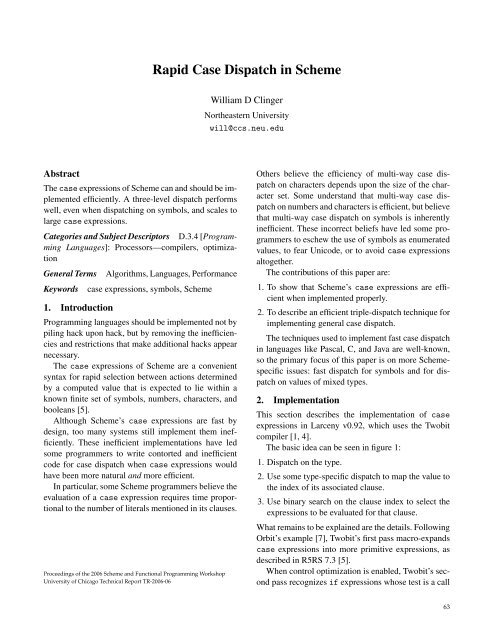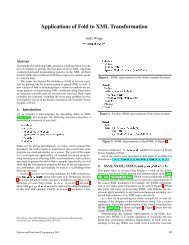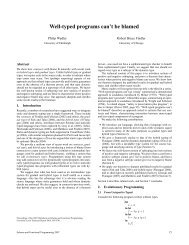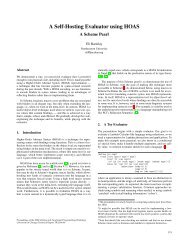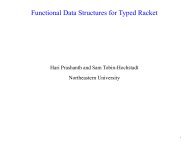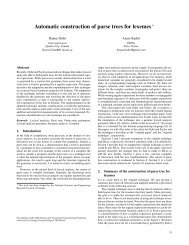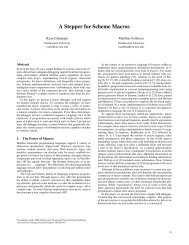2006 Scheme and Functional Programming Papers, University of
2006 Scheme and Functional Programming Papers, University of
2006 Scheme and Functional Programming Papers, University of
Create successful ePaper yourself
Turn your PDF publications into a flip-book with our unique Google optimized e-Paper software.
Rapid Case Dispatch in <strong>Scheme</strong><br />
William D Clinger<br />
Northeastern <strong>University</strong><br />
will@ccs.neu.edu<br />
Abstract<br />
The case expressions <strong>of</strong> <strong>Scheme</strong> can <strong>and</strong> should be implemented<br />
efficiently. A three-level dispatch performs<br />
well, even when dispatching on symbols, <strong>and</strong> scales to<br />
large case expressions.<br />
Categories <strong>and</strong> Subject Descriptors D.3.4 [<strong>Programming</strong><br />
Languages]: Processors—compilers, optimization<br />
General Terms<br />
Keywords<br />
1. Introduction<br />
Algorithms, Languages, Performance<br />
case expressions, symbols, <strong>Scheme</strong><br />
<strong>Programming</strong> languages should be implemented not by<br />
piling hack upon hack, but by removing the inefficiencies<br />
<strong>and</strong> restrictions that make additional hacks appear<br />
necessary.<br />
The case expressions <strong>of</strong> <strong>Scheme</strong> are a convenient<br />
syntax for rapid selection between actions determined<br />
by a computed value that is expected to lie within a<br />
known finite set <strong>of</strong> symbols, numbers, characters, <strong>and</strong><br />
booleans [5].<br />
Although <strong>Scheme</strong>’s case expressions are fast by<br />
design, too many systems still implement them inefficiently.<br />
These inefficient implementations have led<br />
some programmers to write contorted <strong>and</strong> inefficient<br />
code for case dispatch when case expressions would<br />
have been more natural <strong>and</strong> more efficient.<br />
In particular, some <strong>Scheme</strong> programmers believe the<br />
evaluation <strong>of</strong> a case expression requires time proportional<br />
to the number <strong>of</strong> literals mentioned in its clauses.<br />
Proceedings <strong>of</strong> the <strong>2006</strong> <strong>Scheme</strong> <strong>and</strong> <strong>Functional</strong> <strong>Programming</strong> Workshop<br />
<strong>University</strong> <strong>of</strong> Chicago Technical Report TR-<strong>2006</strong>-06<br />
Others believe the efficiency <strong>of</strong> multi-way case dispatch<br />
on characters depends upon the size <strong>of</strong> the character<br />
set. Some underst<strong>and</strong> that multi-way case dispatch<br />
on numbers <strong>and</strong> characters is efficient, but believe<br />
that multi-way case dispatch on symbols is inherently<br />
inefficient. These incorrect beliefs have led some programmers<br />
to eschew the use <strong>of</strong> symbols as enumerated<br />
values, to fear Unicode, or to avoid case expressions<br />
altogether.<br />
The contributions <strong>of</strong> this paper are:<br />
1. To show that <strong>Scheme</strong>’s case expressions are efficient<br />
when implemented properly.<br />
2. To describe an efficient triple-dispatch technique for<br />
implementing general case dispatch.<br />
The techniques used to implement fast case dispatch<br />
in languages like Pascal, C, <strong>and</strong> Java are well-known,<br />
so the primary focus <strong>of</strong> this paper is on more <strong>Scheme</strong>specific<br />
issues: fast dispatch for symbols <strong>and</strong> for dispatch<br />
on values <strong>of</strong> mixed types.<br />
2. Implementation<br />
This section describes the implementation <strong>of</strong> case<br />
expressions in Larceny v0.92, which uses the Twobit<br />
compiler [1, 4].<br />
The basic idea can be seen in figure 1:<br />
1. Dispatch on the type.<br />
2. Use some type-specific dispatch to map the value to<br />
the index <strong>of</strong> its associated clause.<br />
3. Use binary search on the clause index to select the<br />
expressions to be evaluated for that clause.<br />
What remains to be explained are the details. Following<br />
Orbit’s example [7], Twobit’s first pass macro-exp<strong>and</strong>s<br />
case expressions into more primitive expressions, as<br />
described in R5RS 7.3 [5].<br />
When control optimization is enabled, Twobit’s second<br />
pass recognizes if expressions whose test is a call<br />
63


